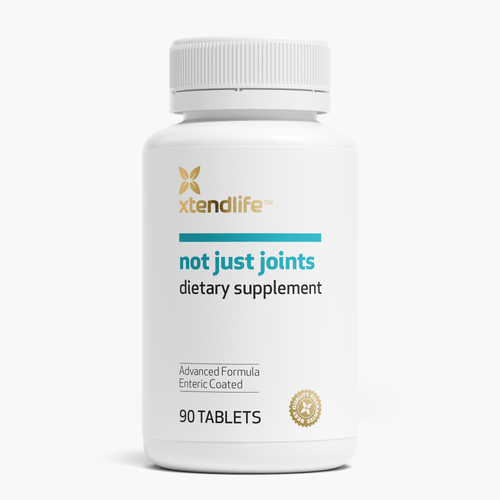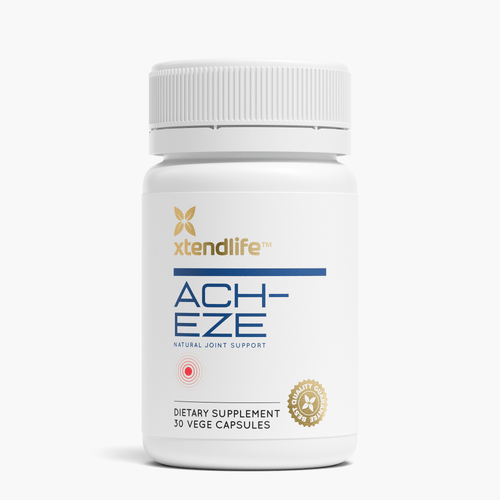Many of us have experienced joint pain, some might disappear after a while, and some might become chronic. Joint pain is irritating, it limits you from enjoying your hobbies, doing normal activities, or even affecting your sleep.
Arthritis is a chronic condition of joints, the main trigger involves inflammation. The most common form of arthritis is Osteoarthritis (OA), especially in older people due to the tissues in the joint breaking down over time.
However, it’s not just the older adults who are affected. Experts now know that many factors besides age are involved in this issue[1]. The diagnosed with osteoarthritis are mostly when people are older (about half of those over 65 have it to some degree), but it might have been a long-existing issue considered a normal part of aging. The truth is that you can reduce the risk of Osteoarthritis while you are young by eating the right foods and exercising regularly[2].
1. Is Arthritis Preventable?
Although you can't always prevent arthritis, there are ways to reduce the risk and delay the potential chance of certain types of arthritis. Stay active, maintain a healthy weight, avoid injuries, and build strong muscles and bones are all ways to support joint health and minimize risks.
2. Does Sugar Cause Joint Pain?
Yes. Sugar, especially processed sugar can trigger cytokine in the body, this inflammatory marker is most likely to aggravate inflammatory conditions, causing joint pain or worsening symptoms of arthritis.
Sweet fruit and 100% fruit juice with no added sugar can be part of a healthy diet when enjoyed occasionally. Fruit juice should not be consumed daily because it’s high in sugar, which may lead to various health issues, including increased inflammation[3].
3. Is Gluten Bad for Joint Pain?
Yes. Gluten from wheat, rye, or barley may promote inflammation which affects the body's soft tissue and sometimes causes joint pain. According to a study from the Oxford Journal of Rheumatology, 41 percent of the studied group suffering from rheumatoid arthritis feel improvement when switched to gluten-free diets[4].
4. Does Dehydration Cause Joint Pain?
Yes. About 70 to 80% of your joint cartilage consists of water[5], it’s an essential component of synovial fluid in the joints. This fluid is like lubrication for the joints, keeping them safe and moving comfortably. Dehydration may increase the risk of chronic inflammation, over time, this can negatively impact overall health, even leading to chronic health conditions, including joint issues.
5. What Food Should I Avoid?
Cutting back on foods that promote inflammation is a good place to start with. According to the US National Arthritis Foundation, foods that are linked with inflammation and joint pain include sugar, aspartame (artificial sweetener), saturated fats, trans fats, high levels of omega-6 fatty acids, refined carbohydrates, MSG, gluten/casein, alcohol, and processed meat[6][7].
6. Should I Eat Oily Fish?
Making fish your main protein and getting adequate omega-3s are important to improving your diet for arthritis. As mentioned previously, excessive amounts of omega-6 can promote inflammation, so we need more omega-3s to help regulate it, keeping a healthy balance of omega-6 and omega-3 fatty acids.
7. Are Legumes Good for People With Arthritis?
Yes. Legumes are rich in essential nutrients such as fibre, vitamins (such as folate and B vitamins), minerals (such as magnesium, potassium, and iron), and antioxidants. These nutrients can support overall health and well-being, which is also important for managing arthritis. Beans and lentils also have strong anti-inflammatory properties which can be beneficial in alleviating arthritis symptoms[8].
8. What Vitamins Are Good for Joints?
There are several well-known ingredients and supplements commonly associated with promoting joint health and reducing joint discomfort, such as glucosamine, chondroitin, MSM, omega-3, turmeric, and collagen. These ingredients are often used as part of a comprehensive approach to managing joint health[9] [10]. Let’s look at each of them in detail.
- Glucosamine and chondroitin:
- MSM (Methylsulfonylmethane):
High-strength formula
Support joint flexibility and repair. 30+ active ingredients including glucosamine and chondroitin.
Shop now
- Green Lipped Mussels:
- Turmeric/Curcumin:
Find HydroCurc® in Ach-Eze, and pure curcumin turmeric extract in Not Just Joints
- Undenatured Type-II collagen:
Find in Ach-Eze
Joint Comfort
Award-winning ingredients clinically tested for natural pain and joint support.
SHOP NOW
Find in Ach-Eze
References:
[1] https://www.health.harvard.edu/staying-healthy/exercise-rx-for-overcoming-osteoarthritis
[2] https://www.medicalnewstoday.com/articles/322603
[3] https://www.arthritis.org.nz/2023/03/07/does-fruit-juice-cause-inflammation/
[4] https://www.rhcnj.com/blog/the-5-best-and-worst-foods-for-those-managing-arthritis-pain
[5] https://orthopedicassociates.org/dehydration-and-joint-pain-how-your-hydration-is-affecting-joint-health/
[6] https://www.medicalnewstoday.com/articles/foods-to-avoid-with-arthritis
[7] https://www.arthritis.org/health-wellness/healthy-living/nutrition/foods-to-limit/8-food-ingredients-that-can-cause-inflammation
[8] https://issuu.com/arthritisnz/docs/nz_joint_autumn_2023_for_issuu
[9] https://arthritis.ca/about-arthritis/arthritis-types-(a-z)/types/osteoarthritis/osteoarthritis-self-management
[10] https://www.nutrition.org.uk/health-conditions/bone-and-joint-health/healthy-eating-tips-for-people-with-arthritis/


 Supplements
Supplements Superfoods
Superfoods Bundles
Bundles
















